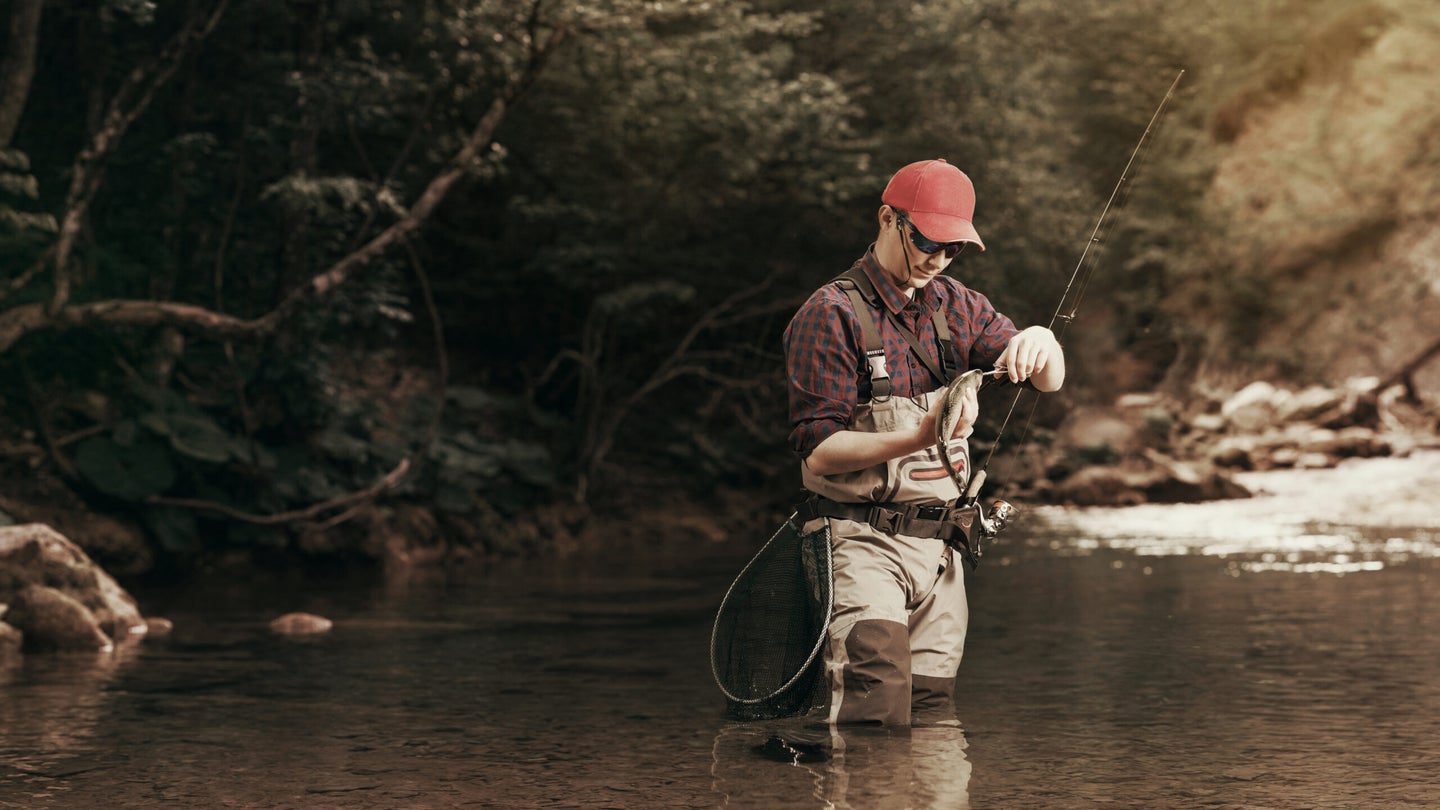Creek Fishing 101: How to Have a Big Time on Little Streams

Fisherman caught a fish takes the hook. Trout fishing on the river. Adobe Stock
We may earn revenue from the products available on this page and participate in affiliate programs. Learn more ›
Before we can talk about creek fishing, we have to define a creek. While it varies by region and depends on who you ask, my definition of a creek is a small- to medium-size body of flowing water at the mercy of seasonal conditions. In other words, there’s no spring feeding it or keeping it cool year-round. Save for perhaps a bump in traffic if it receives a trout stocking during the spring. It’s not a destination nor a world-class fishery. Frankly, a good creek is overlooked and under-pressured because it doesn’t (usually) scratch the big-fish itch, and it doesn’t contain a lot of “glam species.” There are loads of waters like this where I live in the Northeast, and, as crazy as it might sound, they’re some of my favorite places to fish.
Local creeks are the perfect places to take kids for rock bass, sunnies, or stocked trout. Joe Cermele
I like creek fishing because, for one thing, I enjoy solitude, and local creeks are the only places I can go in the summer where I’m just about guaranteed to get it. Why? Because most people don’t get excited about rock bass, green sunfish, bluegills, suckers, tiny smallmouths, and the odd leftover stocked trout. But my 5-year-old son is. One rod, a few hooks, a bobber or two, and a tub of nightcrawlers are all we need to catch anything in the creeks. If he gets bored, he can go swimming. He can flip rocks and hunt for crayfish (which also make great bait). To be honest, though, I don’t take him along all the time. If you tailor your gear and approach, you can easily make creek fishing a little more “grown up.” Here’s how I go about creek fishing in summer, and whether my son is with me or not, I feel like a kid again as soon as I set foot in that water.
Creek Fishing Table of Contents
Creek Fishing Gear
Top Creek Fishing Lures
Creek Locations and Tactics
FAQs
Creek Fishing Gear: Keep It Simple
A small spinning reel and a panfish rod are all you need for creek fishing. Bass Pro Shops
Whereas so many angling pursuits drive us to carry mountains of tackle and be prepared for a wide range of scenarios throughout the day, a creek allows you to be minimalistic. For the most part, you’re chasing smaller fish that don’t usually require you to dial in a specific lure or pattern. Common creek players like bluegills, sunfish, rock bass, creek chubs, and juvenile bass aren’t often selective, and they rarely lack aggression. At the same time, one of the most exciting parts of fishing a creek is that the potential exists in every hole and around every turn for a surprise from a larger fish. In the creeks where I take my son, for instance, every once in a blue moon a 2- to 3-pound smallmouth will latch onto his worm and take him for a heck of a ride. It’s not common and you can’t count on it, but it’s worth being prepared for it.
My favorite creek combination is an ultra-light 6-foot, 9-inch Omen Panfish Rod from 13 Fishing, matched with a 1000-size Shimano Stradic reel. While that rod length may seem a little long, I’ve found that the added length helps deliver light lures and baits more accurately, and the slower action of the rod makes the fight with smaller fish more fun. I’ll spool up with 2-pound test Trout Magnet SOS line, which is hair-thin but very strong. In fact, I can confirm that it’s strong enough to handle those occasional big smallies, assuming you’re deft in fighting and adjust your drag quickly.
Aside from a rod and reel, all you need is a small chest pack that will hold one or two mini tackle trays, an old pair of sneakers, some bug spray, and you’re all set. As for what goes in those tackle trays, it couldn’t be simpler.
Top Creek Fishing Lures
The author’s favorite four lures for fishing local creeks. Bass Pro Shops
On any creek I fish, I’m confident that I can catch anything that swims in it with four lures. The first would be the Trout Magnet. These tiny soft-plastic mealworm imitators come in a massive array of colors, but brown, gold, black, and chartreuse are my favorites for summertime creek action. Fished below a foam EZ Float, the micro shad-dart head that comes with them makes the lure quiver and flash as it drifts through runs and seams. You can also twitch the float through slow holes and runs to make the little jig dance. If I could only choose one lure for creek fishing, this would be it, but I do believe in a little more variety.
The two hard lures I’m never without are the 2-inch Yo-Zuri Floating Pin’s Minnow and the 2.5-inch Rebel Pop-R. The Pin’s is great in shallow, rocky water because you can just let it float along and impart twitches of the rod tip to make it dive, wobble, and pop back up. Not only does it allow you to add a little finesse to your presentation, but it’s not as likely to get hung up as other lures. The Pop-R serves a dual purpose. Big rock bass and smaller creek smallmouths will positively clobber it, but the dressed tail hanging below it also mimics a flying insect in the water, and white perch, bluegills, and chubs will often grab it and just pull the popper under.
My final must-have is a Panther Martin spinner in the itty bitty 1/32-ounce size. Because of its teardrop body shape, it casts like a bullet despite its size and perfectly matches the micro baitfish you often see schooled up along the edges of a creek. With your arsenal set, the final piece of the puzzle is dialing in your approach.
Three Key Creek Locations and Tactics
Sunfish are eager players in small local creeks. Joe Cermele
The most obvious areas to target on creeks are deep holes, particularly in summer when the water gets low. What you must be mindful of, however, is water clarity. Never forget that if you can see the fish, the fish can see you, even if you’re looking into a hole that’s 3 feet deep or more. In clear water, depth isn’t enough to stop the fish from being alerted to your presence and getting spooked. Ideally, the water level or color will provide enough cover that you don’t have to be super stealthy. Most of the time when I take my son to a local creek, we never leave the “big hole” under the bridge, and every worm or Trout Magnet we cast gets smashed for hours on end. But if you are dealing with clear water, approach a hole cautiously and keep your distance. Study the area and figure out where you can stand so you’re not right on top of the fish. Generally, position yourself downstream and cast up and across. But if you need to avoid casting a shadow on the honey hole, get upstream if necessary and drift baits and lures downstream to minimize your intrusion. Try not to kick up rocks or silt as you wade that will flush down into the target zone ahead of you.
Another area you never want to pass up when creek fishing is a sharp outside bend. When a creek takes a hard turn, it often carves away the bank on the outside where the flow is the quickest. Conversely, the inside of that turn usually features softer, calmer water. That slower inside can also hold fish, but I’ve found that during the summer, fish gravitate to the faster outside flow because it provides more oxygen. The cool part about creek fish in an outside turn is that they also tend to be very aggressive because the current will carry their food away quickly. It’s a great area to swing a tiny spinner and have it get blasted just before it sweeps into the soft inside water.
The final area I never walk past when creek fishing is a long, slow, glassy stretch of water with a little bit of depth. Granted, if the water is clear, you need to be stealthy in this kind of water, but it’s often perceived as unproductive because it lacks the characteristic of deep holes and turns. I’ve actually pulled a lot of bigger smallmouths and rock bass out of this kind of water, and I believe it’s because it provides a happy medium where fish aren’t competing in a hole, but the slower current makes it easier to root for crayfish and chase minnows. I’ll keep my distance and start with a popper in these areas. You may not have any confidence in what seems like “junk water” until a fish comes out of nowhere and explodes on the lure.
FAQs
Q: What kind of fish are in creeks?
Creeks can hold a number of species, but the most common are trout, rock bass, green sunfish, bluegills, suckers, and bass.
Q: How do you catch big fish in creeks?
While creeks aren’t common places to catch big fish, it is still possible to hook into good-sized trout or bass. Of course, “good size” is relative to the body of water and species. But anglers who want to target bigger fish should focus on the deepest parts of the creeks, overhanging brush, and undercut banks. Cold, cool water is a great place for a big fish to hide.
Q: What is the best bait for creek fishing
Some of the top lures for creek fishing include the Trout Magnet, the Yo-Zuri Floating Pin’s Minnow, a 2.5-inch Rebel Pop-R, and a Panther Martin spinner. All of these baits will produce strikes from common creek fish species.
The post Creek Fishing 101: How to Have a Big Time on Little Streams appeared first on Field & Stream.
Articles may contain affiliate links which enable us to share in the revenue of any purchases made.
